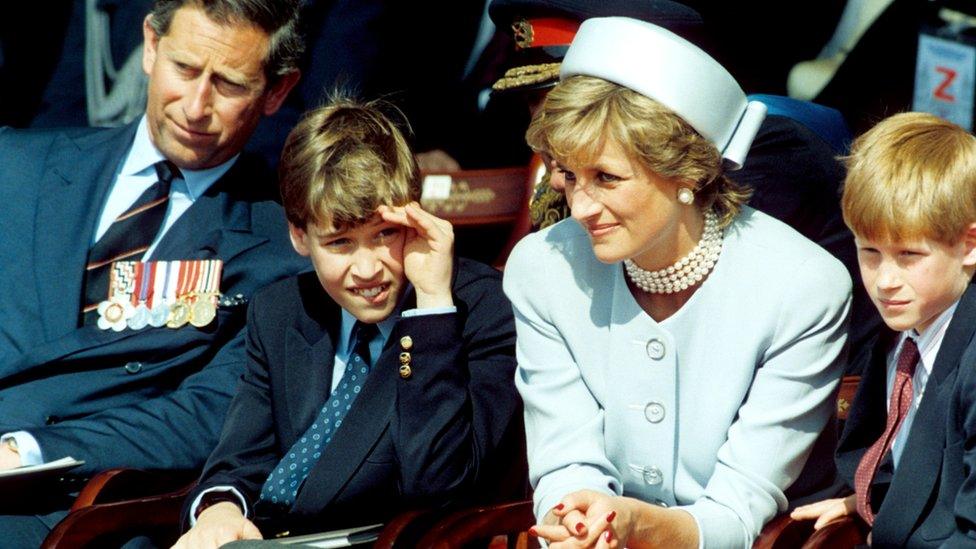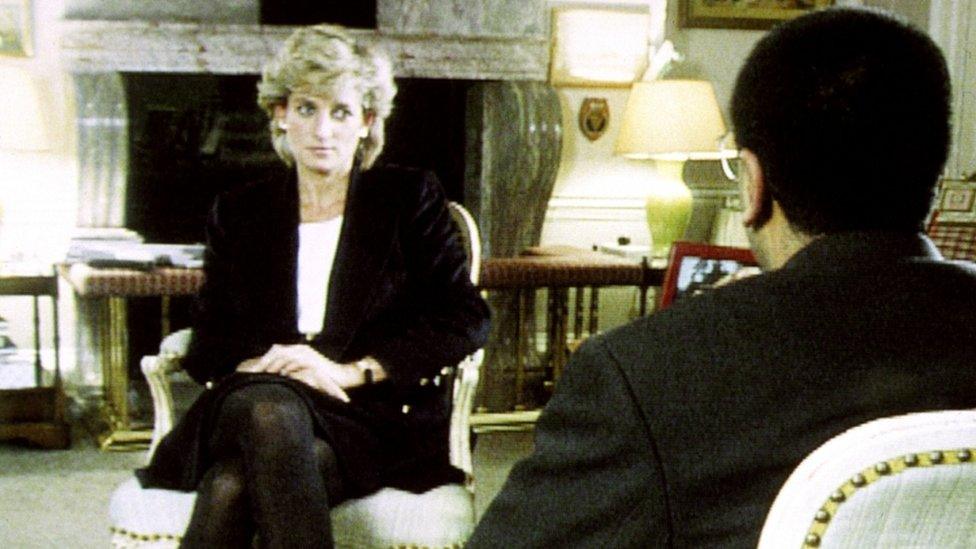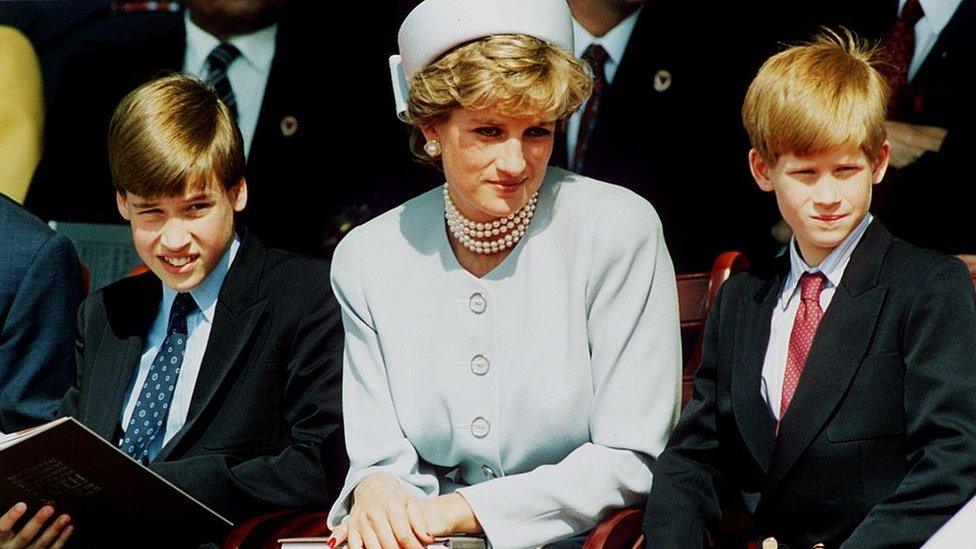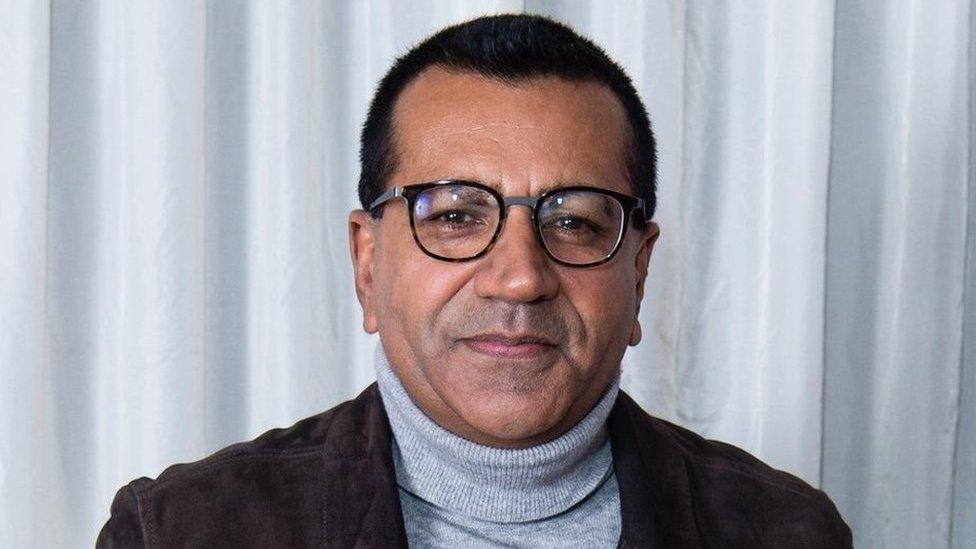Princess Diana interview: Martin Bashir apologises to Princes William and Harry over interview with their mother
- Published
- comments
WATCH: Why has the BBC apologised to Prince William and Prince Harry over it's interview with their mother, Princess Diana?
Prince William has blamed BBC failings over its interview with his mother Princess Diana for letting the Royal Family down, letting the public down and making his parents' relationship worse.
The interview, which was 25 years ago, was the first time a serving royal had spoken so openly about life in the Royal Family - viewers saw her speak about her unhappy marriage to Prince Charles, their other relationships and her mental health issues.
Now, the journalist who conducted the interview, Martin Bashir, has said he is "deeply sorry" to her sons, William and Harry, the dukes of Cambridge and Sussex.
However, speaking to the Sunday Times, Bashir said he "never wanted to harm" Diana, adding: "I don't believe we did."
An independent inquiry has concluded that the former BBC journalist used deception to get the interview.
The inquiry found the interview was organised using deceitful methods and the BBC fell below its standards.
The Duke of Cambridge said he was "most saddened" Diana never learned she had been deceived. He said his mother was failed "not just by a rogue reporter" but also by BBC bosses.
The BBC has written to apologise to Princes William and Harry, as well as the Prince of Wales and Diana's brother Earl Spencer.

Princes William (centre) and Harry (right) were children when the BBC interview was aired
What has happened?
On Thursday 20 May, a report was published following an independent investigation looking into how a world-famous interview with Princess Diana was secured by the BBC in 1995.
Princess Diana - Prince William and Prince Harry's mother - was one of the most famous people in the world at the time.
The inquiry found that former BBC journalist Martin Bashir - who did the interview - acted in a "deceitful" way and faked documents to obtain it.
In early 1996, an internal BBC inquiry was carried out and this cleared everyone involved of any wrongdoing.
Now another investigation - led by a retired judge - has found that the BBC covered up the "deceitful" way the interview was achieved.
The inquiry also found that the BBC "fell short of the high standards of integrity and transparency which are its hallmark". And the BBC's boss Tim Davie said: "We are very sorry for this. Lord Dyson has identified clear failings."
Now, the man who was the BBC's director of news at the time the interview aired, Tony Hall, has been forced to resign from his current job.
Lord Hall, who later went onto become the director general of the BBC, quit his role as National Gallery chairman on Saturday.
He said his continued presence would be a "distraction".
The inquiry described the internal BBC investigation led by Lord Hall in 1996 as "woefully ineffective".
What was in the interview?

The interview is one of the most famous in British history
This interview with Princess Diana was the first time a serving royal had spoken so openly about life in the Royal Family - viewers saw her speak about her marriage to Prince Charles (William and Harry's father) and her struggle with an eating disorder.
It was shown on the news programme Panorama and is now one of the most famous interviews in British history. More than 23 million people watched it.
What has Prince William said?

Princess Diana with Prince William (left) and Prince Harry (left)
It's very rare for Prince William to speak out and criticise the BBC in this way and it's a very big deal.
Speaking about the interview, Prince William said what happened was a "major contribution to making my parents' relationship worse", adding it has "since hurt countless others".
He added that in his view, the way the interview was obtained "substantially influenced what my mother said" in the interview and said it and should never be aired again.
• Mr Bashir seriously breached BBC rules by mocking up the fake bank statements that helped him gain the trust of Earl Spencer (Diana's brother)
• By gaining access to Diana through her brother, Mr Bashir was able to persuade her to agree to give the interview
• And as media interest in the interview increased, the BBC covered up what it had learnt about how Mr Bashir got the interview
• Lord Dyson said this "fell short of the high standards of integrity and transparency which are its hallmark"
Prince Harry also responded to the report, saying: "Our mother was an incredible woman who dedicated her life to service. She was resilient, brave, and unquestionably honest."
He added that this was "the first step towards justice and truth. Yet what deeply concerns me is that practices like these - and even worse - are still widespread today. By protecting her legacy, we protect everyone, and uphold the dignity with which she lived her life. Let's remember who she was and what she stood for."
Princess Diana was failed not just by reporter Martin Bashir but by leaders at the BBC, says Prince William.
What has the BBC said?
The BBC's current director general, Tim Davie, said: "Although the report states that Diana, Princess of Wales, was keen on the idea of an interview with the BBC, it is clear that the process for securing the interview fell far short of what audiences have a right to expect.
"We are very sorry for this. Lord Dyson has identified clear failings."
He added that when it did its first investigation, the BBC should have "made greater effort to get to the bottom of what happened at the time and been more transparent about what it knew".
What has Martin Bashir said?

Martin Bashir originally received lots of praise for the rare interview with a much-loved member of the Royal Family
In an initial statement, Mr Bashir apologised for mocking up the fake documents, saying "it was a stupid thing to do" and that he deeply regrets it. He also said he remained "immensely proud" of the interview.
Mr Bashir has now spoken to a newspaper, The Sunday Times, to further give his side on the interview.
Mr Bashir told the paper he "never wanted to harm" Diana, adding: "I don't believe we did."
Despite apologising to Princes William and Harry, he rejected William's claim that he added to Princess Diana's paranoia, saying they were close and he "loved" her.
Mr Bashir said Princess Diana was never unhappy about the content of the interview and said they remained friends after the programme aired.
"Everything we did in terms of the interview was as she wanted, from when she wanted to alert the palace, to when it was broadcast, to its contents," he told the paper.
But on having used forged bank statements he said: "Obviously I regret it, it was wrong. But it had no bearing on anything. It had no bearing on [Diana], it had no bearing on the interview."
